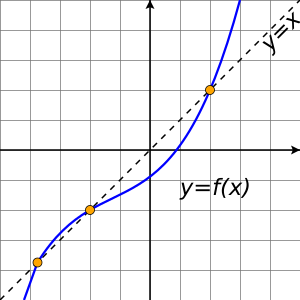Fixed point facts for kids
A value x is a fixed point of a function f if the function doesn't change it. This means that when you put x into the function f, you get x back as the answer. We write this as f(x) = x. Think of it like a special spot where a rule (the function) leaves things exactly where they are.
Contents
What is a Fixed Point?
Imagine a function as a machine that takes something in, does a specific job, and then gives something out. For example, a function might take a number, double it, and then add one.
A fixed point is a special input number for that machine. When you put this special number into the machine, the output is the exact same number you put in! It's like a magical number that the function can't change.
Easy Examples
Let's look at some simple examples to understand fixed points better:
Example 1: Squaring a Number
Consider the function that squares a number. We can write it as f(x) = x2.
- If we put in 2, we get 22 = 4. (Not a fixed point)
- If we put in 0, we get 02 = 0. So, 0 is a fixed point!
- If we put in 1, we get 12 = 1. So, 1 is also a fixed point!
- If we put in -1, we get (-1)2 = 1. (Not a fixed point)
This function has two fixed points: 0 and 1.
Example 2: Adding One
Now, let's look at the function f(x) = x + 1. This function simply adds 1 to any number you give it.
- If we put in 5, we get 5 + 1 = 6.
- If we put in 100, we get 100 + 1 = 101.
Can you think of any number x where x + 1 would be equal to x? No matter what number you pick, adding 1 to it will always make it bigger. So, this function has no fixed points.
Example 3: The Identity Function
Consider the function f(x) = x. This function simply gives you back whatever you put in.
- If you put in 7, you get 7.
- If you put in -3, you get -3.
For this function, every single number is a fixed point!
Why are Fixed Points Important?
Fixed points might seem like a simple idea, but they are very important in many areas of mathematics, science, and engineering.
- Solving Equations: Finding fixed points can help solve certain types of equations. If you want to solve f(x) = x, you are looking for fixed points.
- Predicting Outcomes: In some systems, like weather patterns or how populations grow, fixed points can represent stable states or long-term behaviors. If a system reaches a fixed point, it means it has settled down and won't change much unless something else happens.
- Computer Science: Fixed points are used in computer programming, especially in areas like recursion (when a function calls itself) and in understanding how computer programs behave.
Think of a spinning top. When it's spinning fast, it's moving. But if it slows down and settles, it might find a fixed point where it just stands still without falling over. That's a stable fixed point.
See also
 In Spanish: Punto fijo (desambiguación) para niños
In Spanish: Punto fijo (desambiguación) para niños
 | William M. Jackson |
 | Juan E. Gilbert |
 | Neil deGrasse Tyson |


